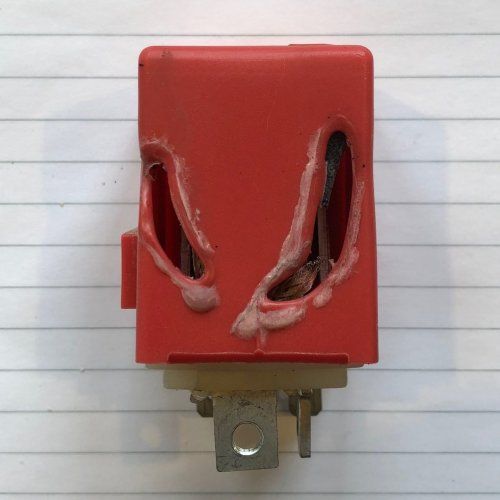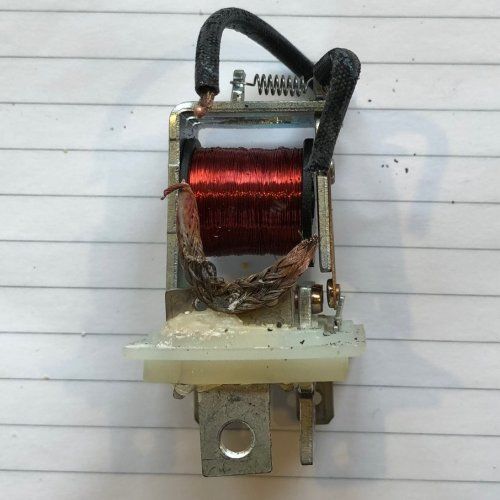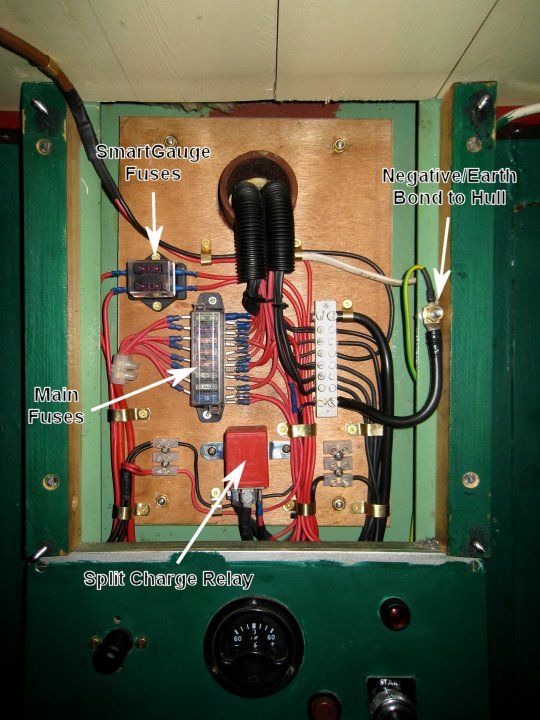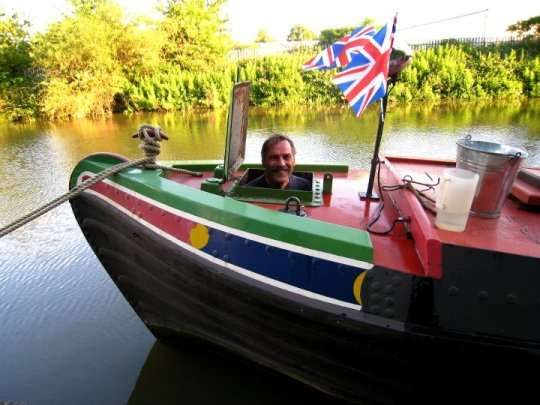-
Posts
6,306 -
Joined
-
Last visited
Content Type
Profiles
Forums
Events
Gallery
Blogs
Store
Everything posted by NB Alnwick
-
I have attended enough of Tony's lectures to know that he talks sense. I can now see that I may have to look at some re-wiring. This may also include fitting a switch that can combine battery output like the one illustrated below. This would make life easier if/when the starter batteries fail. I have not yet calculated what the starter motor draws during cranking - the switch illustrated is good for 1200A. Blue Sea Systems e-Series Selector Battery Switch
-
Obviously, when our boat was fitted-out in the 1990s the arrangement with the Lucas 33RA relay was considered appropriate. The present arrangement gives charge preference from the Lucas/CAV AC5R alternator (24v, 55A) to the starter batteries and only charges the domestic bank when the relay operates. When connected to the mains or our portable generator, the Sterling 20A charger provides what is described as an "intelligent charge" to both sets of batteries. For my purposes, a simple manual switch would suffice in place of the Lucas relay. The starter batteries would need be recharged as soon as the engine has started but once up to full charge the charge can be switched to the domestic bank where there is likely to be a continuous drain. I still have two spare Lucas relays but my plan is to have a good look at the requirements and change the wiring round to provide the best solution. I have purchased a VSR rated at 100A but at this stage, I am not sure if it will provide the ideal solution.
-
Certainly a very odd looking boat - I guess someone loves it?
-
In this case, dry cells caused by my laziness in failing to keep them topped up!
-
-
On re-checking the gear control wheel more thoroughly - I can see that I significantly exaggerated the number of turns necessary to move the shaft from ahead to astern. It is roughly two and a half full turns of our control wheel and the gearing is nearer to 3 to 1. This means that there is about one whole turn of the gearbox sprocket to go from one direction to the other. Having said that, in an emergency it seems like a lot more than just 2½ full turns of the wheel! The good news is that 'Alnwick' is now back on its home mooring at Cropredy - the return journey which I completed single handed was much less eventful and quite pleasant despite the odd shower.
-

Explains my electrical system which is like no other
NB Alnwick replied to LadyG's topic in Boat Building & Maintenance
I concur with the above - especially the first point. I have just fitted a pair of brand new engine start batteries. They were sold as fully charged but before fitting I charged them both overnight using my standard Halfords 8 Amp chargers (fortunately I have two of these) and in that state they started my engine after a couple of revolutions BUT they then continued to accept a very high rate of charge from the engine Alternator (measured on the engine ammeter) for the next eight hours of cruising! Clearly, these new batteries were not charged to anything approaching their capacity. -
The image below shows what I have behind my uncomplicated control panel - I still have a spare Lucas split charge relay (and they are still available at a reasonable price) but I will take the foregoing advice and procure a more reliable replacement. The options are a VSR rated at 100 Amps or the Allbright SW180B - I need to check the dimension to make sure that the replacement will fit the space available. My other current project is the installation of a bilge water warning lamp just in case the automatic switch on the bilge pump fails to activate again. The link to the ARC catalogue provides a useful source of the necessary parts for this too.
-
Interesting - there is currently a wide beam moored on the towing path of the North Oxford - I passed it yesterday . . . Is this notice mandatory or advisory?
-
This post cannot be displayed because it is in a forum which requires at least 10 posts to view.
-
I too, decided that our that the fire was necessary - it was the right decision especially after getting a good soaking Yesterday!
-
Well that was like turning the clock back eleven years! Tony and David you both contributed to the original topic in February 2010! I appreciate that many things have changed with time - but we still have the same old boat with the same old challenges . . .
-
This really is resurrecting a very old thread! I repaired my Lucas 33RA relay back in 2010 and my soldered repair has lasted more than ten years. Before I repair it again - I just thought I would check to see if there has been any real progress in the market place with reliable split charge relays? I recall that Gibbo recommended products made by Albright and Sir Nibble suggested a Cargo product. What else are folks using?
-
Yesterday I witnessed two potentially fatal near miss accidents. A couple of first time hirers appeared to be having difficulty controlling their hire craft - at the first narrow bridge that they encountered they put the tiller over hard the wrong way causing the boat to head for the brick abutment. They then put the boat in reverse and when the boat collided with the brickwork they both lost their balance and almost fell over the stern. Then at their first lock, they clearly had no clue as to what to do - I watched one of the pair jump ashore from the stern in bare feet and that person clearly hurt one or both feet because they almost fell-in backwards and subsequently limped badly. At the same time the steerer had put the boat in gear astern - so if the person had have fallen in, the boat would have gone over them. Then although they were going uphill and the lock was empty, they tried to open the top paddles. By this time, I was ashore, having tied up, and I was able to explain the process of working the locks. The steerer said that they had a 20 minute explanation of how to manage the boat but could not remember the explanation of how locks were to be negotiated! I know that before I hired for the first time I spent a lot of time watching boaters going through locks and bought books about boating. I also had experience of small boats and diesel engines. Even so there is a lot to remember when taking a boat out for the first time. Fortunately, there have been few deaths to hirers* on the the canals but that is not an excuse for the lack of adequate training. My view is that C&RT should require hire companies to provide a minimum of half a days safety training to all novice boaters and that this should include a practical demonstration of taking a boat through a lock. * The one I remember was on nb Harry (hired from Kate Boats) which occurred in a lock near Cropredy. The boat is now in private ownership and I saw her moored on Oxford Canal waterside moorings at Newbold near Rugby yesterday.
-
The gas locker is astern of the water tank - the space below the gas locker with fresh water pump and pipework is accessed from inside our bed 'ole under the deck.
-
That is good news - it always saddens me when I learn that manufacturers of good honest and useful products cease trading. For what it's worth, the fresh water tank on 'Alnwick' is lined with nothing but rust and after 16 years we are still alive . . . That's me standing upright in the tank (during cleaning) and I am 6 foot tall! I have wondered about getting it grit blasted and epoxy coated - it is a big tank!
-

Discharged starter battery
NB Alnwick replied to George and Dragon's topic in Boat Building & Maintenance
Very slightly off-topic - does anyone here use an Adverc battery management system? We have a fairly sophisticated charger installed for charging when connected to the mains and an Adverc for controlling the charge from our CAV AC5R alternator. Our boat has 24v electrics and when charging from the alternator the Adverc will cycle with higher voltage spikes for brief periods. The charge voltage is affected by battery temperature which is monitored by the Adverc and during very cold weather this higher voltage can be as much as 29 volts - 20% higher than the nominal battery voltage of 24v. We recently had a problem with our starter batteries when they became completely dry. However, this was my fault because, having replaced the domestic bank with maintenance-free batteries, I failed to pay the required attention to the starter batteries. The starter batteries on 'Alnwick' take some punishment because they usually provide enough grunt to spin-up our Kelvin K3 on full compression and then get recharged fully. Normally, they would have been inspected and topped up with de-ionised water every week but during three years of an enforced lack of boating activity, I completely neglected this essential maintenance. Having said that I am wondering if the cyclic high voltage spikes from the Adverc may have exacerbated the failure of our starter batteries? -

Discharged starter battery
NB Alnwick replied to George and Dragon's topic in Boat Building & Maintenance
Good advice . . . -
Allan, Are you on the 'good stuff' already?
-

Leisure batteries - advice on what to buy
NB Alnwick replied to cairanvanrooyen's topic in Build Blogs
Thanks for that David - I guess it answers my question. I rather hope that British workers had minimal personal protective equipment at least and an environmentally safe way of disposing of waste acid but even so it looks like a dangerous job!!! -

Leisure batteries - advice on what to buy
NB Alnwick replied to cairanvanrooyen's topic in Build Blogs
When I purchased my first car in 1963, for a modest fee, it was possible to take my dead battery to a small workshop in Market Harborough where they would drain it, strip the top off, fit new plates and terminals, refit the top, seal it with bitumen tar, refill it, and charge it ready for collection the next day. I wonder what happened to those workshops? -

Leisure batteries - advice on what to buy
NB Alnwick replied to cairanvanrooyen's topic in Build Blogs
I think it is likely that there is a great deal of label engineering going on with batteries. Quite likely there is an anonymous factory in Korea or another place in Asia that churns out batteries in large quantities - then buyers representing companies from around the world select what they want and put their own labels on them for sale in their home country. We have six batteries on Alnwick that measure 330mm long, 172mm wide, and 240mm high - roughly the size of a common HGV battery. The best we ever had were supplied second hand at £25 each from a forum member these had 3/8 BSW or UNC screw stud terminals. Since then we have tried to find new replacements of similar size and with similar terminal styles. There are many to choose from but the brand name doesn't seem to make much difference to the performance or guarantee longevity. -

Leisure batteries - advice on what to buy
NB Alnwick replied to cairanvanrooyen's topic in Build Blogs
While searching for an equivalent maintenance-free battery to replace the Bosch L4 034 that now seem to be difficult to find, I found these on eBay - less money and almost identical: https://www.ebay.co.uk/itm/393248842452 These are very similar: https://www.ebay.co.uk/itm/114293873461 -

Leisure batteries - advice on what to buy
NB Alnwick replied to cairanvanrooyen's topic in Build Blogs
We have been using these since the supply of cheap batteries from Vince1969 dried up about ten years back. They are not always in stock at main suppliers but can usually be found at just over £100 each from a reputable supplier on eBay. As we recently found, they also make excellent engine start batteries and the 'maintenance-free' attribute suits lazy boaters like me. The full specification is: Manufacturer: Bosch Article number: 0 092 L40 340 Battery Capacity [Ah]: 105 Voltage: 12V Battery type: Lead Acid, maintenance free Length [mm]: 330 Width [mm]: 172 Height [mm]: 238 Post type: BS Taper Post positions: Central at both ends Warranty: 4 years -
Good old fashioned British Engineering! Excellent!






